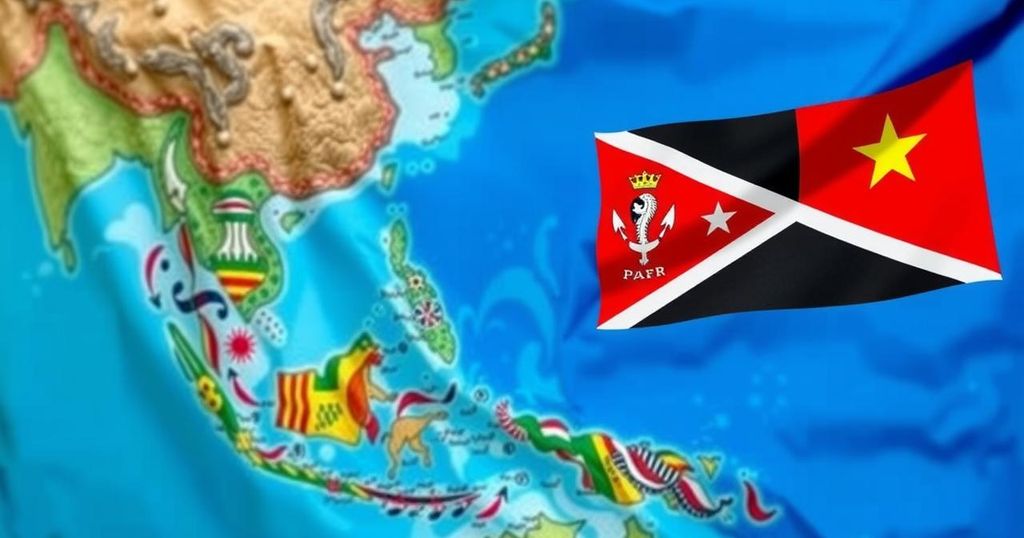Papua New Guinea has announced a boycott of the upcoming UN climate summit, labeling it a ‘total waste of time’ due to the ineffectiveness of major polluter actions. Foreign Minister Justin Tkatchenko criticized the lack of meaningful progress at previous conferences and the bureaucratic hurdles faced by adaptation funds. The nation plans to pursue climate agreements bilaterally with countries like Singapore to address carbon issues directly. This reflects a broader discontent among smaller nations with the current climate negotiation framework.
In a significant move, Papua New Guinea has announced its decision to boycott the upcoming UN climate summit scheduled for this November, expressing profound dissatisfaction with the ongoing negotiations aimed at mitigating global warming. The country’s Foreign Minister, Justin Tkatchenko, characterized these talks as “a total waste of time,” primarily attributing this sentiment to the detrimental actions of major polluting nations. In an interview with AFP, Minister Tkatchenko articulated his frustration, stating, “There’s no point going if we are falling asleep because of jet lag because we’re not getting anything done.” He further emphasized the disparity in climate assistance, claiming that substantial funds promised by leading polluters often end up benefiting consultants rather than facilitating genuine climate relief. Papua New Guinea, an island nation housing the world’s third-largest rainforest, faces severe vulnerabilities to climate change, compounded by its impoverished status and frequent natural disasters. The Minister lamented, “We are sick of the rhetoric as well as the merry-go-round of getting absolutely nothing done over the last three years,” underlining the nation’s position as a key player in global environmental efforts despite feeling neglected. Previous COP summits, most notably the COP21 event where the Paris Agreement was forged, have been marred by criticism regarding inadequate action from dominant polluters. Furthermore, adaptation funds established to support developing nations frequently encounter bureaucratic delays that undermine the urgency of the climate crisis. Civil society groups have also called for boycotts against the COP summits, emphasizing the need for authentic climate action over performative discussions. As an alternative to the UN gatherings, Papua New Guinea intends to pursue bilateral climate agreements with countries such as Singapore, which are identified as potential partners in addressing carbon footprint issues. Tkatchenko remarked, “With like-minded countries like Singapore, we can do 100 times more than COP.” Papua New Guinea is participating in a critical International Court of Justice case designed to determine the accountability of polluters for their neglect of climate responsibilities. The decision to boycott reflects a growing sentiment among vulnerable nations that substantial action on climate change has been insufficiently prioritized by global powers. In conclusion, Papua New Guinea’s boycott of the UN climate summit signifies a robust statement regarding the ineffectiveness of the prevailing climate negotiation framework and highlights the urgent need for more direct and actionable commitments from all nations involved in addressing climate change.
The United Nations climate conferences, known as COP meetings, are annual gatherings aiming to foster international cooperation in combating climate change. Originally popular for facilitating significant agreements, such as the Paris Agreement, subsequent summits have been criticized for stagnating progress, especially as large polluting nations are perceived to evade meaningful action. Developing nations, particularly small island states that are highly threatened by climate change, often feel overshadowed by the larger economies during these discussions and have begun expressing their frustration through calls for boycotts and alternative arrangements for climate cooperation.
The boycott by Papua New Guinea serves as a crucial indicator of the mounting disillusionment among smaller nations regarding the efficacy of the UN climate conferences. By shifting towards bilateral negotiations for climate solutions, Papua New Guinea not only reinforces its stance against the perceived inaction of larger nations but also seeks to establish a pathway for more impactful climate interventions. The global community must heed the voices of vulnerable nations in its ongoing engagement with climate policy and action.
Original Source: www.straitstimes.com







